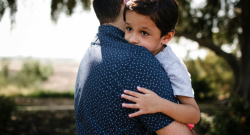Author: Krista Upop Manager
6 Ways to Help Your Child Build Resiliency for Times of Uncertainty
Resiliency is the ability to bounce back after difficult times. It is important to help your child learn how to build their resiliency skills for times that they may need it. As we have learned this year the world can change quickly and the way that we deal with adversity and stress is an important skill. Here are six ways that you can help your child build resiliency for the difficult times that they might face.
1. HELP THEM LEARN HOW TO MANAGE STRESS HELP
Everyone will deal with stress but how they manage those feelings will help them with their resiliency. Stress may even be helpful if their mindset is to learn from tough things. A safe outlet for their energy is important for dealing with stress. An important way to help your child learn how to manage stress, or eliminate stress is to make time for play. Make sure that your child has an outlet for their energy and a way for them to be creative. The play might be hanging out with friends, or taking part in a sport, or just free play at home.
2.TEACH THEM TO PRACTICE PROBLEM SOLVING
You have been teaching your child how to solve problems from the moment that they were born. They learned that if they were hungry, they would cry, and you would feed them. One of the first skills that children need to learn to for solving problems is identifying and then naming their feelings. When your child is mad, sad, frustrated, hungry or frustrated name those feelings so that they can make a relation from the way their body is feeling to the name of that feeling. This will help them in identifying which solution will make them feel better.
3. SHOW THEM HOW TO DEVELOP POSITIVE ATTITUDES
When something tough happens, it can be helpful if you reframe the experience in a positive way. For example, if they had to go to the hospital and get blood work, and they cried during, afterwards you can explain to them the things that they did well during the procedure. They may have cried, but they were also able to hold their body still, acknowledge those positive things and this will help them create a positive mindset, instead on just focusing on the things that went wrong or the negative things and help them build their resiliency.
4. SUPPORT THEM IN FOSTERING FRIENDSHIPS
Peers are very important in tough times even for children. Friends can bring out the best qualities in someone, help them sort out their feelings or help them forget about the tough feelings. Help your child create new friendships in showing them how to talk to new people or involving them in recreational groups. Also give your children time to hangout with their friends. Playdates and time after school and on weekends is important for your child to build and maintain relationships with peers. Make sure you make time for them to have some time with friends during the week so they can release their stress, build resiliency and most important have fun!
5. HELP THEM BUILD A COMMUNITY OF SUPPORTIVE ADULTS
Support your child in making friendships and stay connected with supportive adults in their life. These adults will help in the guidance of healthy choices. Supportive adults may be relatives, neighbours, teachers, coaches or leaders. The phrase “it takes a village to raise a child” is true. These adults will be trusted people that will help support your child. They will be their sounding wall and cheerleader along with you so help your child build this community of supporting adults. You can do this by talking about those adults in a positive way and letting them know that they are safe people who care about them and are there to support them too.
6. WORK WITH THEM TO BUILD SAFE SPACES
Safe spaces are places that your child can come to where they feel comfortable. This place might be their home, or their bedroom. It is a place where they can rest and recharge. Ideally, they will have many safe spaces in their life. Teachers work hard to make classrooms safe spaces for their students by making them cozy, bright, clean and have items that spark creativity. Work with your child to create spaces that will be a retreat for them when times are tough.
Acknowledging the Complex Grief Associated with COVID-19
Over the past few months we have experienced more loss than most people have in their lives and this is especially true for our younger population. First, we lost our work, next we lost school, then we lost the ability to see our friends and extended families, and then we lost our routines and sense of safety. We may have even lost sight of how to navigate this new COVID-19 world. Well, what most news sources and social media articles are failing to mention is that we are all experiencing complex grief associated with the pandemic.
Grief is an emotion someone feels after the loss of someone or something. Often times grief is associated with the loss of an important person in one’s life, but people can grieve the loss of something too.
Here are some of the losses and grief that you and your child might be experiencing right now and some ways to help cope with these feelings.
NON-DEATH AND SECONDARY LOSSES
Non-death loss is the loss of something in one’s life and this can cause someone to grieve. Non-death losses are all of the things that changed after the pandemic hit. The loss of routines, going to school, seeing friends and family, and so much more.
Secondary losses are the other losses that come with losing a loved one, or a major loss in one’s life. Control is one of the major secondary losses that is being experienced right now along with relationships and friendships with colleagues, classmates and teammates, and routines, celebrations and events.
A way to ease the pain is to acknowledge these losses and brainstorm ways to help bring some of these things back. Schools are now having online sessions, and people have been very creative in coming up with ways to keep connections with family and friends. For example, doing an activity with a grandparent over a video chat, such as baking or reading a book together.
ANTICIPATORY GRIEF
Anticipatory grief is the feeling that occurs before an impending loss. This may feeling like being on edge, finding yourself or your child angry at things that are out of control, or always thinking about the worst-case scenario. Anticipatory grief may also cause exhaustion, withdrawal, or avoidance.
With the unprecedented nature of COVID-19, things are forever changing month to month, week to week, day to day and even hour to hour. Once we have had a chance to wrap our heads around the changes, things seem to change again and now we are in a state of always anticipating the next big change.
Some things that you can do to help with this type of grief is to establish routines. Routines help take out the stress of wondering what the next big change is and create some stability in the “new normal.”
AMBIGUOUS LOSS
Ambiguous loss is a loss that occurs without closure or a clear understanding of what happened. This coronavirus seemed to change life as we knew it so quickly. On March 11, 2020 Canada declared a pandemic and then in the next few days schools across Canada were closed without even a chance for good-byes. There was little time to understand and process what was happening to Canada and the world. A lot of things were lost in the first few weeks of this pandemic, creating many ambiguous losses.
Helping your child learn about COVID-19 and all of the new terminology that is being used may help them have a better understanding of how their world has changed and may create a sense of normalization. For most people the term social-distancing is new, as well helping your child understand that the coronavirus, novel coronavirus and COVID-19 are all terms that are being used interchangeably to describe the virus that is affecting the world right now.
We are all learning together during this time and as you can see everyone is going through a lot. As restrictions begin to ease up in some areas, other things may take a little longer to return to as it once was, so it’s important to be kind to ourselves and others as everyone deals with grief and loss differently. It’s okay to make mistakes, have do-overs and acknowledge the complex grief that you and your child have experienced.
The ABC’s of Grief
Grief is such a tricky thing, because everyone grieves differently, and each loss can be grieved differently. The loss of a loved one is hard for even the most experienced adult, and there is no exception for a young person. The way someone grieves can be based on previous experiences in life and the developmental stage of the person going through the loss.
Here are three ways that you can support the young person in your life through grief.
Allow your teen or child to grieve.
- Help them process their feelings, in a supportive way. Try just listening to them and acknowledging their thoughts and feelings.
- Children grieve in “puddles” meaning that they tend to be sad or angry one moment and then the next moment they are back to laughing and playing. This is all completely normal.
- Teenagers on the other hand grieve more like an adult but don’t yet have all the life experience to cope with all of these big feelings. They understand the permanence of death, and have the ability to deal with loss but only based on their previous experiences.
Be there for them.
- Be there for them when they need to talk. Teenagers may feel that no one understands what they are going through because they are in an egocentric phase of development so it is very important to empathize with them and just be present when they need someone.
- Be there for them when they need a break from the grief. Younger children have this innate ability to take breaks from their grief through play, and this time might be a good opportunity for you too, to take a break from those hard feelings for a moment. Teenagers may need to be encouraged to hangout with their friends.
Connect them with a community.
- The importance of finding your “tribe” is so important especially to youth who strive on community and social acceptance. Finding that group of friends is even harder, and more important when a youth have gone through something that not many of their peers have, like the loss of a parent or a sibling.
- Help connect them with a supportive community of peers who understand what they are going through. This community could be a local grief support group, or a bereaved summer camp or the Grief Pop-Up on Upopolis.
Introducing the Upopolis Grief Pop-Up
Upopolis saw this need and has created a special place for youth going through grief. This community aims to help these youth find someone else who just gets what they’re going through.
Coping: Be Prepared
I don’t know about you, but it took me a while to figure out the best way to cope and reduce my anxiety for an upcoming medical procedure.
This is what I have learned:
- Gather the facts; get your hands on age-appropriate information (only from a trusted source like UKNOW, the age-appropriate medical information database on Upopolis). Research tells us that our imagination is so much worse than the truth.
- Write down your questions. After you’ve read up, write down any questions that have popped up. If you have time before you go to a test or procedure check-in with your Child Life Specialist or someone from your healthcare team. If you don’t have time to meet before, bring your questions to your procedure, ask them there.
- Go over the procedure in your mind. Visualize it. Pay attention to what you are doing during the procedure. Are you watching? Are your eyes closed? Do you want to know what’s happening next?
- Bring an object of comfort with you. Do you like music? Do you like to read? Do you have something you like to snuggle with? You may not be allowed to bring it into the procedure but it will be really nice to have it right after.
- Finally, reflect. What worked? What didn’t work? Write it down so you can bring these findings with you next time.
I found the biggest thing for me was reflecting. Getting to know and understand myself and how my body reacts in times of stress was HUGE in helping me conquer my anxiety. What works for you[ ?



